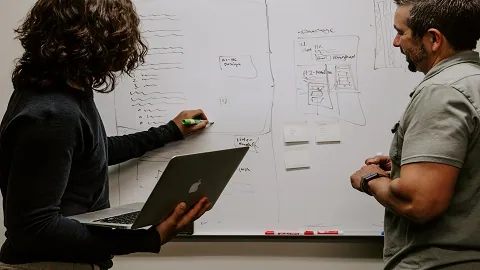Business Development Manager
A business development manager is the growth guru of a company. They're the driving force behind expanding the business, seeking new opportunities, and building relationships.
With a keen eye for potential partnerships, they identify ways to increase revenue and market presence. They're not just salespeople; they're strategic thinkers who map out the path to success. They must have strong communication skills, be able to work independently and as part of a team, and have a deep understanding of the company's products and services. In short, they play a critical role in driving the growth and success of a business.
- Introduction
- Typical Job Responsibilities
- Standard Work Environment
- Suggested Work Experience
- Recommended Qualifications
- Projected Career Map
- Beneficial Professional Development
- Learn More
- Conclusion
A business development manager identifies growth avenues and establishes strategic partnerships. They devise sales strategies, nurture client relationships, and present offerings to potential customers. Researching markets, negotiating deals, and coordinating with internal teams are key aspects. They manage budgets, track metrics, and contribute to achieving sales goals. Participation in industry events keeps them informed about trends. Their role is vital in expanding clientele, enhancing market presence, and driving revenue.
Business Development Manager
A business development manager is the growth guru of a company. They're the driving force behind expanding the business, seeking new opportunities, and building relationships.
With a keen eye for potential partnerships, they identify ways to increase revenue and market presence. They're not just salespeople; they're strategic thinkers who map out the path to success. They must have strong communication skills, be able to work independently and as part of a team, and have a deep understanding of the company's products and services. In short, they play a critical role in driving the growth and success of a business.
A business development manager identifies growth avenues and establishes strategic partnerships. They devise sales strategies, nurture client relationships, and present offerings to potential customers. Researching markets, negotiating deals, and coordinating with internal teams are key aspects. They manage budgets, track metrics, and contribute to achieving sales goals. Participation in industry events keeps them informed about trends. Their role is vital in expanding clientele, enhancing market presence, and driving revenue.
Business development managers usually operate in office settings but frequently travel to meet clients, attend conferences, and explore new markets. They engage in both individual tasks, like market research and proposal preparation, and collaborative activities, such as team meetings and strategy discussions. This role demands strong communication skills for networking, negotiations, and presenting. It often involves flexible hours to accommodate client schedules and international time zones. The environment is dynamic and fast-paced, requiring adaptability to changing industry trends and competitive landscapes.
The ideal work experience for a business development manager typically involves 3-5 years in progressively responsible roles within sales, marketing, or business development. This may include experience in lead generation, client relationship management, and strategic planning. Exposure to B2B or B2C environments, depending on the company's target, is valuable. Experience in negotiating deals, conducting market research, and achieving sales targets demonstrates effectiveness in the role. Previous involvement in industries relevant to the company's offerings provides a foundation for understanding market dynamics and customer needs, aiding in the creation of successful growth strategies.
A strong candidate for the role of business development manager should possess a provable educational background in business, marketing, or a related field. A bachelor's degree in business, marketing, or a related field can be advantageous, but is not always essential. Around 3-5 years of experience in sales, marketing, or business development is typically needed to reach higher-level roles. Proficiency in market analysis, lead generation, and relationship building is crucial. Strong communication, negotiation, and presentation skills are essential. A track record of success in meeting sales targets and cultivating strategic partnerships adds further weight to a candidate's qualifications.
- Business Development Associate: Begin as a Business Development Associate, supporting senior managers in market research, lead generation, and proposal preparation.
- Business Development Executive: With experience, advance to a Business Development Executive, responsible for managing client relationships, conducting sales presentations, and closing deals.
- Business Development Manager: Progress to the role of a business development manager, leading a team of executives and overseeing business strategies, expansion plans, and revenue growth.
The projected career map offers opportunities for growth and leadership within the business development domain, with each step rewarding experience, skills, and achievements, leading to a fulfilling and successful career in driving organisational growth and success.
- Sales and Negotiation Skills: Enhancing sales techniques, negotiation strategies, and closing deals effectively to drive revenue growth.
- Market Research and Analysis: Developing expertise in market research, competitor analysis, and identifying new business opportunities.
- Leadership and Team Management: Strengthening leadership abilities to inspire and guide teams towards achieving business goals.
- Relationship Building: Improving networking and relationship-building skills to foster strong partnerships with clients and stakeholders.
- Business Strategy: Attending workshops on strategic planning and business development to create long-term growth strategies.
These professional development opportunities equip business development managers with valuable skills, fostering personal growth and enhancing their ability to drive business success through effective strategies and collaborations.
What Does the Process of Business Development Include?
The process of business development involves identifying potential clients, researching markets, creating strategies, engaging in networking, and nurturing client relationships. business development managers also negotiate deals, present offerings, and monitor industry trends to drive revenue growth and expand the company's market presence.
What Does a Typical Business Development Plan Include?
A typical business development plan outlines market analysis, target audience identification, competitive landscape assessment, and strategies for reaching potential clients. It includes approaches for lead generation, sales tactics, relationship building, and key performance indicators to measure success. This plan guides business development managers in achieving growth objectives.
In short, the role of a business development manager is pivotal in driving a company's expansion and revenue. With skills in communication, strategic thinking, and sales, they navigate market complexities, forge relationships, and shape growth strategies. Their efforts not only boost profitability, but also shape the organisation's future success.












